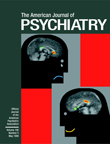Occult Gastrointestinal Bleeding With Anorexia Nervosa
To the Editor: Occult gastrointestinal bleeding hypothesized to be caused by transient gut ischemia is a complication of endurance running (1). Endoscopic studies have identified vascular lesions due to this complication only when done within 48 hours after a long-distance run (2, 3). Presented here is a variation of this complication in a hospitalized patient with anorexia nervosa, initially unrecognized as such because the patient’s running was covert.
Ms. A was a 16-year-old girl transferred to our hospital with a 3-year history of anorexia nervosa. Three months before her transfer, Ms. A had developed iron deficiency anemia (hemoglobin=7.6 mg/dl, ferritin=2 g/liter). Results of Hemoccult testing were positive, and a HemoQuant test result showed elevation at 11.5 mg hemoglobin/g of stool (0–2.0 normal). Ms. A had been hospitalized for 7 months, was within 5 pounds of her ideal body weight, and had not menstruated for 1 year. Symptoms included ritualistic and compulsive exercising but not surreptitious vomiting, laxative abuse, or other behaviors that could contribute to gastrointestinal blood loss.
An upper gastrointestinal fluoroscopic examination, small bowel follow-through, barium enema, esophagogastroduodenoscopy, small bowel enteroclysis, proctoscopy, colonoscopy, abdominal CT scan, pelvic ultrasound, and a radioactive Meckel’s scan were all normal. The iron deficiency was considered to be of unknown etiology; Ms. A’s hemoglobin returned to normal with iron supplementation.
Six weeks after admission to our hospital, Ms. A had hypochromic, normocytic anemia (hemoglobin=9.6 mg/dl) and had lost 12 pounds. Results of two of three Hemoccult tests were positive. Iron and ferritin studies were nondiagnostic.
Records from the transferring facility and our hospital indicated that Ms. A was found running in place several times in her bedroom or bathroom. Upon questioning, she admitted to regularly running in place for at least 2 hours during the night.
Running was discontinued, and Ms. A’s activities were intensively monitored. Results of six of six Hemoccult tests were negative over the following 2 months. Hemoglobin normalized with iron supplementation and an improved diet.
Excessive exercising is often a prominent symptom of patients with anorexia nervosa (4) but, as with this patient, it may be underreported. The anemia of anorexia nervosa is usually a normochromic, normocytic anemia without iron deficiency (5). The evaluation of iron deficiency anemia or occult gastrointestinal bleeding in a patient with anorexia nervosa should include a careful assessment of the patient’s physical activities.
1. Stewart JG, Ahlquist DA, McGill DB, Ilstrup DM, Schwartz S, Owen RA: Gastrointestinal blood loss and anemia in runners. Ann Intern Med 1984; 100:843–845Crossref, Medline, Google Scholar
2. Gaudin C, Zerath E, Guezennec CY: Gastric lesions secondary to long-distance running. Dig Dis Sci 1990; 35:1239–1243Google Scholar
3. Schwartz AE, Vanagunas A, Kamel PL: Endoscopy to evaluate gastrointestinal bleeding in marathon runners. Ann Intern Med 1990; 113:632–633Crossref, Medline, Google Scholar
4. Beumont PJV, Arthur B, Russell JD, Touyz SW: Excessive physical activity in dieting disorder patients: proposals for a supervised exercise program. Int J Eat Disord 1994; 15:21–36Crossref, Medline, Google Scholar
5. Devuyst O, Lambert M, Rodhain J, Lefebvre C, Coche E: Haematological changes and infectious complications in anorexia nervosa: a case-control study. QJM 1993; 86:791–799Medline, Google Scholar



